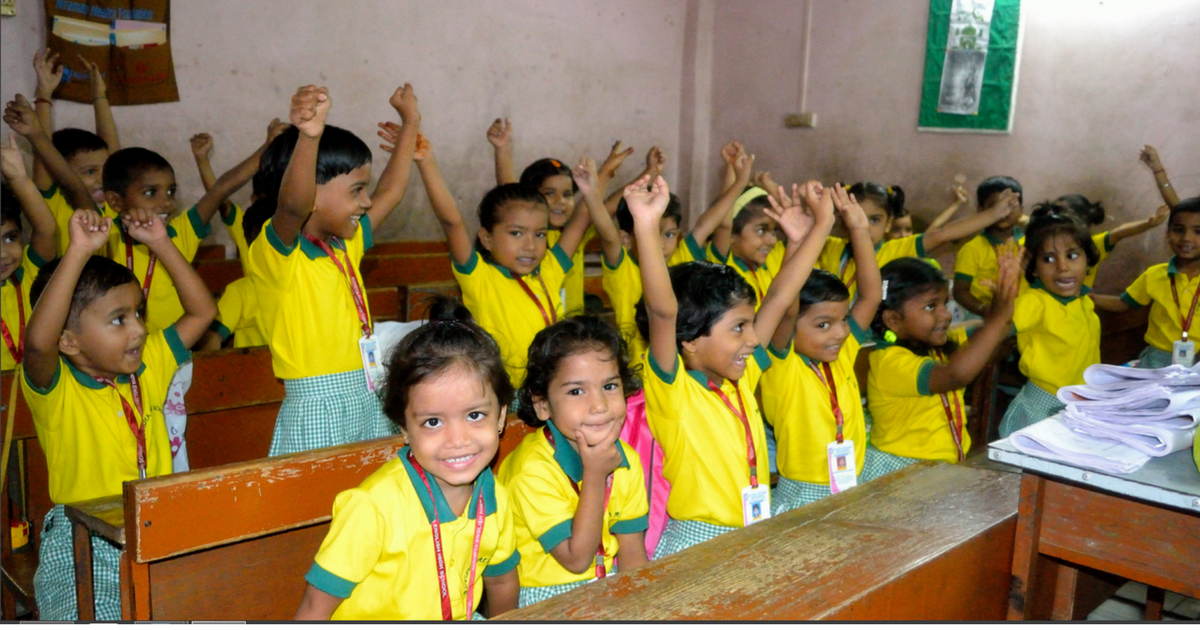Despite India’s remarkable progress towards universalising primary education, learning outcomes remain poor: only 35 percent of ninth and tenth graders in government and private schools are able to read at a level expected of a fourth grader.1
One of the reasons for these poor learning outcomes is the weak foundation in the early years. Research by FSG found that over 54 percent of children entering Grade 1 in affordable private schools (APSs)2 could not pick out the correct number of objects corresponding to numbers from 10-20 (for example, picking 13 pencils from a stack of 20); 78 percent could not read three simple three-letter words. [quote]The education solutions that could transform pre-schooling already exist, but are currently limited to the upper end of the market.[/quote]The science behind the potential of high-quality early learning is clear, as is the fact that children from low-income households—a group that constitutes 70 percent of urban India—are likely to benefit disproportionately from improvements in early learning.
Our research to understand how we could help unlock this potential yielded interesting insights. We found that low-income parents already clearly valued pre-schooling: 95 percent had enrolled their 2-6 year-old children at a pre-school provider, despite no legal requirement to do so.
We also found that parents care about the quality of pre-schooling and are willing to invest in it: 86 percent of low-income families were investing in private options (typically APSs) because they believed these to be of better quality.
In 2014, we launched the Program to Improve Private Early Education (PIPE), a multi-year initiative that aims to improve learning outcomes for over 200,000 low-income children in India, and set the urban APS market on the path to transforming learning outcomes for children from low-income urban households.
The programme is premised on the idea that the education solutions that could transform pre-schooling already exist, but are currently limited to the upper end of the market. The challenge is providing access to them inside APSs. PIPE is currently working with seven solution providers and is already in 161 APSs across five cities.
Related article – Education in India: Where funders need to focus

The solutions to transform pre-schooling already exist, but are currently limited to the upper end of the market. The challenge is providing access to them inside affordable private schools. (Photo Courtesy: FSG)
The past three years of the programme have surfaced some key lessons for the team on designing a programme for sustained impact at scale.
1. Leverage existing motivations
While changing behaviour can be very hard, leveraging existing motivations to achieve this can be extremely effective. For example, the main motivation of parents for pre-primary enrolment is to help their child learn basic academic skills, especially English and mathematics. [quote]An approach that leverages existing motivations helps ensure sustainability over the long-term.[/quote] PIPE uses solutions that can help children develop a range of skills, including English, mathematics, working in teams, and executive function. But there is greater emphasis on English and mathematics because these are skills that parents want from pre-schooling. Other important skills such as team work and collaboration are simply not valued by them in equal measure.
We realised early on that if we wanted parents to adopt the PIPE programme, we had to work within their existing belief systems; we needed them to recognise the benefits of the intervention without requiring them to fundamentally shift their beliefs and motivations around what skills their children should be learning in preschool.
An approach that leverages existing motivations in this manner also helps ensure sustainability over the long-term—because all the constituents are doing what they already perceive to be in their best-interest, there is no need for an ongoing intervention.
2. Be prepared to pivot
In order to be successful, programmes must be able to respond to changing conditions and to new information that is learned by working in the system. This may require significant pivots in approach and activities. [quote]In order to be successful, programmes must respond to changing conditions. [/quote] For example, PIPE’s original approach focused on scaling chains of preschools, which specialise in pre-schooling and do not offer any classes beyond kindergarten.
However, data from our research revealed that 74 percent of the four-and five-year olds were attending pre-school at ‘attached providers’—schools that offered classes beyond pre-primary all the way to Grade 10—rather than a ‘standalone’ preschool provider.
The programme therefore had to pivot to meet the realities of the market, and is now focused on improving quality at existing APSs rather than standalone providers—a necessary shift that put the programme on a radically different path from what had been planned and agreed to with funders.
3. Invest in credibility
A key element in achieving impact at scale is the ability to engage with and influence the work of others in the field—credibility is therefore critical. It is important to think about activities that can not only achieve immediate objectives, but also contribute significantly to the broader field and therefore help build credibility. [quote]It is important to think about activities that can not only achieve immediate objectives, but also help build credibility.[/quote] In the case of PIPE, the research spanned over 4,400 parents across eight cities. While a less extensive piece of research could have met immediate project goals, investing in a larger effort allowed us to share new and valuable data with the field and make a significant contribution, despite being a relatively new participant in the conversation.
This laid the foundation for building several key relationships with diverse stakeholders—funders, APSs, education experts and academics—and that continues to be a major strength for the programme today.






